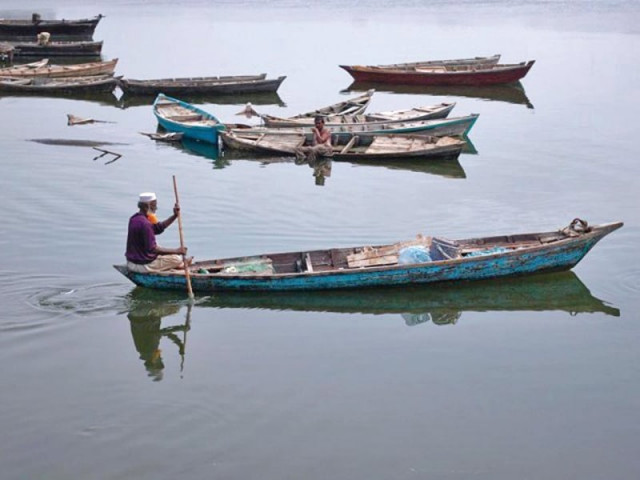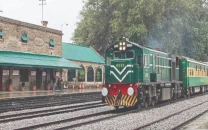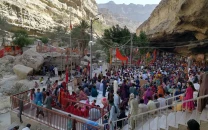Reviving livelihoods: Regeneration of coastal fish stock required in Balochistan
Simple innovations can expedite stock recovery like other parts of world.

There are foreign agencies that are willing to come to the rescue but unfortunately there is no heed to this aspect. For absolute effectiveness, there has to be absolute transparency that is not possible without the involvement, support, help or advice of the international agencies.
The local fishermen should also be trained and allowed full participation in all aspects of reviving the fish stock within the coastal belt of Balochistan that could also be a deterrent to leakage of funds.
Under the International Fund for Agriculture Development (IFAD) project, there was to be a training centre for fishers at Gwadar, to provide instruction in seamanship navigation, safety at sea, and handling and stowing of fish at sea.
The Food and Agriculture Organisation (FAO) was also to provide training for fish inspectors and women fish handlers at each of the landing sites.
Guidelines used by the EU and UK fish inspectors were intended to be followed to achieve high standards of proficiency. But the Balochistan government decided they did not want FAO involved, as they needed all the IFAD funds for their operations and themselves for reasons best known.
Here IFAD’s attention is also drawn to enforce involvement of foreign agencies so that transparency is maintained and funding is dispensed in the right direction and fruitfully.
Due to ignorance and illiteracy, it is difficult for the coastal fishermen to understand the long-term negative impacts and therefore they continue to fish throughout the year. But then again, they cannot be blamed as they do not have any other source of income to stay alive during the off season and are forced to do what they should not be doing.
A chance to restore
There is still a chance and a possibility of the depleted coastal fish stocks to be restored to full health and productivity in four or five years, provided immediate transparent proper measures are undertaken and supported by professional implementation.
If proper action is taken, and well-managed, the Balochistan coast could return to its former abundance. If no remedial measures are initiated, then the marine inshore area will be depleted of fish, leaving only shrimp and some hardy shellfish and the local fishermen will eventually die of hunger with no other recourse available. This could also lead to further deterioration of the law and order situation of the coastal belt.
Similar trends in local fish populations, positive and negative, were seen in the Moray Firth, the Irish Sea, in Newfoundland Canada, in the Java Sea and the Bay of Bengal, as well as in some island fisheries in the North Atlantic but were revived with timely corrective measures taken by those governments.
The measures required are neither difficult nor expensive, but they do require determination on part of the Balochistan government, serious attention and strong management. Balochistan fishers can start with an advantage; they are small scale and would not of themselves cause serious fishing pressure.
What has to stop completely is trawl fishing and harvesting by large vessels in inshore and offshore parts of the sea of Balochistan. It is the responsibility of the Balochistan government to go for a fact-finding mission why this could not be enforced and who is responsible for this negligence.
Police areas fished by trawlers
There are a number of simple innovations that would assist the policy and expedite stock recovery that have been very successful in other parts of the world.
• To prevent illegal fishing and police areas being fished by trawlers would normally require several well-equipped patrol boats assisted by local fishermen.
• But innovations used successfully in Japan, Italy, the Caribbean and elsewhere can be adopted off Balochistan coast. The technology is to plant or drop heavy anchors or other seabed obstacles that will prevent trawl net operation.
• Local trap or gill net fishers can be informed of the location of these underwater obstacles, and set their nets or traps well clear.
• It would also be helpful to issue local fishermen binoculars and cellphones so they might report immediately any activity by trawlers or foreign fleets in the coastal area.
• Local fishermen should be part of the policing team so that underhand deals are deterred.
• A further measure to stimulate fish spawning or protect young fish and crustaceans is to provide habitats suitable for different species. This has been done in Japan, in the Mediterranean and off the coasts of South America and the Caribbean islands.
It is, therefore, expressed upon the Balochistan government to include the participation of FAO so that transparency can be maintained and involve the local fishermen as partners in enforcement of the law, rules and directives of the government for the revival of fish wealth. The province gets enough funding that could support the livelihood of the fishermen during off seasons.
The writer is the former project director and deputy managing director of Saindak Copper Gold Project, Chagai district, Balochistan
Published in The Express Tribune, August 18th, 2014.
Like Business on Facebook, follow @TribuneBiz on Twitter to stay informed and join in the conversation.


















COMMENTS
Comments are moderated and generally will be posted if they are on-topic and not abusive.
For more information, please see our Comments FAQ